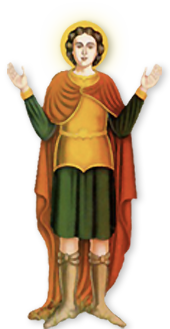By: GEORGE YOUSSEF
 “The Holy Week of Pascha is central in the church life. It is a celebration of God the Heavenly Father’s love. “For God so loved the world that He gave His only begotten Son, that whoever believes in Him should not perish but have everlasting life” (John 3:16). It is also a living remembrance of our Lord Jesus Christ, “who through the eternal Spirit offered Himself without spot to God” (Hebrews 9:14).
“The Holy Week of Pascha is central in the church life. It is a celebration of God the Heavenly Father’s love. “For God so loved the world that He gave His only begotten Son, that whoever believes in Him should not perish but have everlasting life” (John 3:16). It is also a living remembrance of our Lord Jesus Christ, “who through the eternal Spirit offered Himself without spot to God” (Hebrews 9:14).
-Holy Pascha: Order of Holy Week Services in the Coptic Orthodox Church
The word “Pascha” translates to “Passover” which refers to the angel of death that passed over the houses of the Hebrews. These houses were sprinkled with the blood of the Passover lamb, symbolizing the sacrifice of the Cross. Pascha is the name given to the period between Palm Sunday and Good Friday. The entire Holy
Week, however, begins with Palm Sunday and ends on Bright Saturday.
Lazarus Saturday
On Lazarus Saturday, we commemorate the bringing of Lazarus back to life. In the house of Lazarus in Bethany, they prepared a dinner for Our Lord Jesus Christ. Many people came to Bethany to see the man whom Our Lord raised from the dead. This revealed and confirmed the Divinity and authority of Our Lord. Lazarus’ death and decaying body in the tomb symbolizes sin in its final stages. Our Lord raising Lazarus even when he had been dead for four days gives us hope because it shows how our sins may still be forgiven even when it seems too late.
Palm Sunday
On this day, crowds of people came out to meet Our Lord when He arrived to Jerusalem. The people took branches of palm trees and went out to meet Him shouting: “Hosanna (“save us”) to the Son of David! Blessed is He who comes in the name of the Lord!” This was during the time the Jews were expecting an earthly king to save them from Roman occupation and assumed Our Lord would do just that. When the Jews discovered that His intentions were to free us from the bondage of sin and Satan, they turned their backs on Him and cried out to Pilate demanding for His crucifixion.
Holy Monday
Jesus left Bethany in the morning and on His way to Jerusalem, He was hungry. This was when He cursed the fig tree, which did not bear fruit. This is a direct reference to His displeasure in unfruitful souls. He then went to the temple and drove out those who were buying and selling, and He spent the whole day teaching the people in the temple. He left the envious chief priests and went to Bethany to spend the night there.
Holy Tuesday
Jesus left Bethany in the morning. As He walked along the road, He saw that the fig tree dried up and died. A conversation took place between Jesus and the high priests. He warned the Pharisees and gave many parables about the kingdom of God.
Holy Wednesday
The Council of the seventy high priests (the Sanhedrin) assembled and Judas made a plot and betrayed Jesus to the chief priests. Judas started looking for good chance to hand Jesus over to them. This day is called Job Wednesday because of the severe pains that Job suffered. The prophet Job was patient and, in his patience, he became a symbol of Christ.
Covenant Thursday
Covenant Thursday is the day on which Christ celebrated the Passover with His disciples, washed their feet, and also instituted the Sacrament of the Eucharist. After St. Peter and St. John had prepared for the Passover, the disciples began to ask which of them would be first in the Kingdom of Heaven. The Lord in His reply knelt down and began to wash their feet. This was not only teaching humility by example, but it was also the institution of a great work: service. Service is not simply preaching or rebuking, but in truth it is washing the feet. After Christ washed the feet of His disciples, He instituted the Eucharist and it was also during this time that Christ warned St. Peter that he would deny Him. That evening, the Lord retreated to the Garden of Gethsemane, and as He prayed, His sweat became like drops of blood falling to the ground, this is when our Lord goes and wake up his slumbering disciples 3 times (this is where we get our 3 watches of the midnight prayer.) After our Lord is done praying, the soldiers approach and seize him after He was betrayed with the kiss of judas. After He is seized, He is then taken to the high priest and endured a whole night of being judged and tortures until he is presented to Pontius pilot in the morning.
Great Friday
in the beginning, God created Man on the sixth day of creation. It was also on the sixth day that Adam and Eve sinned, and fell from the presence of the Lord. So it was only appropriate that God the Logos be crucified and suffer on the sixth day to complete the act of salvation. The Rite of Good Friday begins with the usual Paschal Prime Prayers. The Icon of Crucifixion is then adorned with roses, with lit candles and censors around it. The Rite continues with the prayers of the Third Hour in the same manner as the rest of the Pascha Week. The priests will then wear their dark cloaks and the deacons their liturgical vestments with their blue stoles as a sign of mourning. During the 6th hour Gospel, as soon as the reader says the words “and there was darkness on the earth,” the candles are blown out and the lights of the Church switched off, in remembrance of the darkness that fell upon the earth during the Crucifixion of our Lord. At the end of the 11th hour, the deacons move up to the first chorus and the veil of the sanctuary is opened. The deacons and priests also switch from their black vestments to their annual vestments and the lights are turned back on. The lamentations of Jeremiah are then read, followed by the paschal praise, then the psalm Pek Ethronos (Your throne O God) is chanted then the Gospel is read. After the Gospel is concluded, the congregation prostrated 400 times (100 in each direction) then the priests, and the deacons begin the procession with the icon of the crucifix that will be buried at the conclusion of the procession.
Bright Saturday
Joyous Saturday is the night between Good Friday and the Sunday of Resurrection. It is the night that our Lord descended to hades and freed those who were held captive. Joyous Saturday is the only Saturday of the year on which the Church observes abstinence from food and drink, because on this day the Lord remained buried in the tomb. For this reason, the Church is simultaneously mourning and rejoicing. She mourns the passions of the Lord Jesus who died for our sins and was buried in the tomb. Meanwhile, she rejoices at our salvation from death. We find, therefore, that the hymns on this night are chanted in the mournful and annual tunes.
Sources:
https://suscopts.org/
http://www.copticheritage.org/
Holy Pascha: Order of Holy Week Services in the Coptic Orthodox Church













 Subscribe to RSS Feed
Subscribe to RSS Feed